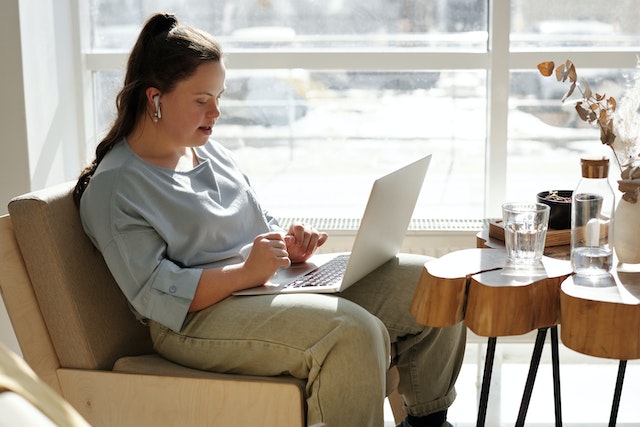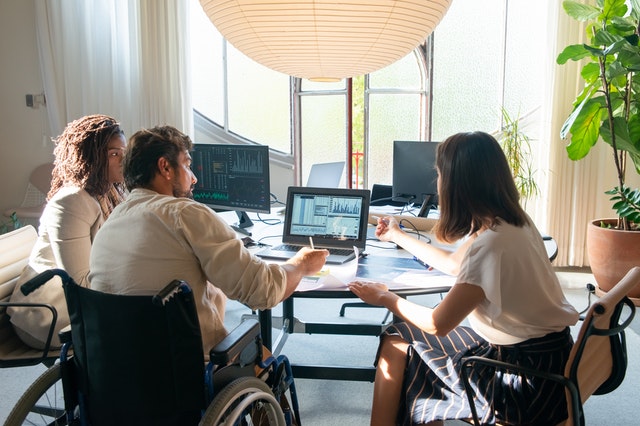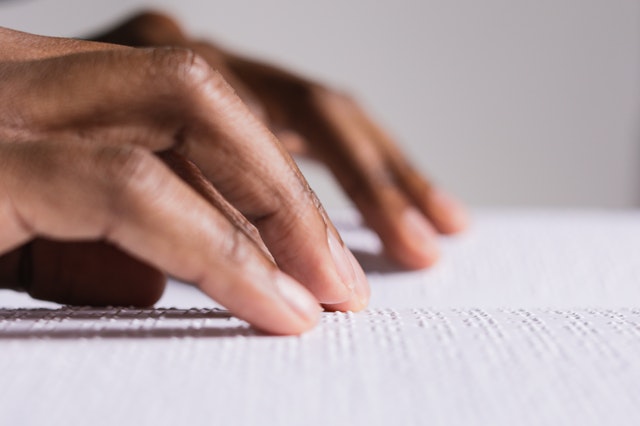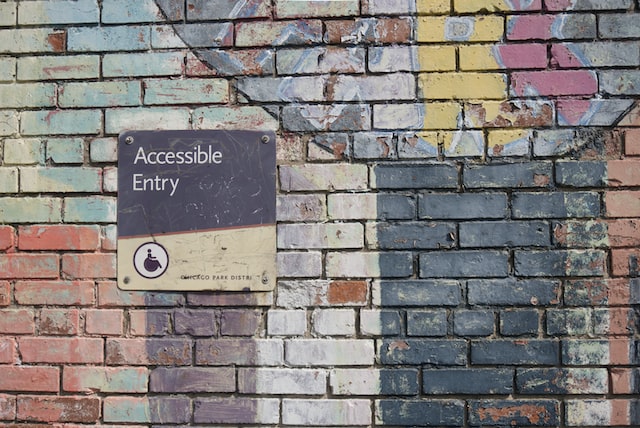2022 International Day of Persons with Disabilities, UN and related reports
Tue 13 Dec 2022
December 3 marked the United Nations International Day of Persons with Disabilities. In this news story we highlight recent recommendations from the UN Committee on the Rights of Persons with Disabilities, as well as related reports.

The International Day of Persons with Disabilities aims to promote an understanding of disability issues and mobilise support for the dignity, rights and well-being of disabled people. The theme for 2022 is "Transformative solutions for inclusive development: the role of innovation in fuelling an accessible and equitable world."
This year the UN Committee on the Rights of Persons with Disabilities looked at New Zealand's progress on the UN Convention on the Rights of Persons with Disabilities. Following this examination, the UN Committee published their Concluding observations on the combined second and third periodic reports of New Zealand (CRPD/C/NZL/CO/2-3) in September 2022.
The Committee made more than 50 recommendations in their concluding observations. Specific to article 16 of the Convention (Freedom from exploitation, violence and abuse) the Committee raised concerns about the high rates of violence experienced by disabled people, noting the high levels of gender-based violence experienced by women and girls with disabilities, including Māori and Pasifika women and girls with disabilities. The Committee also noted concern that "The National Strategy to Eliminate Family Violence and Sexual Violence is gender-neutral in relation to its focus on persons with disabilities."
In response to these concerns, the UN Committee recommends that (paragraph 32):
"...in close consultation with and with the active involvement of persons with disabilities, in particular women and girls with disabilities, including Māori and Pasifika women and girls with disabilities:
(a) Develop measures to address the high rates of violence experienced by persons with disabilities and to combat all forms of gender-based violence for inclusion within outcome area 4 of the New Zealand Disability Strategy;
(b) Incorporate gender-specific measures for the disability focus within the National Strategy to Eliminate Family Violence and Sexual Violence and ensure specific issues for women and girls with disabilities are mainstreamed throughout the Strategy."
The Committee also raised concerns that disabled people currently in institutional settings experience violence, abuse and neglect that is similar to violence identified through the Abuse in Care Royal Commission of Inquiry. In response, the Committee recommends (paragraph 34):
"The Committee recommends that urgent action be taken to amend legislative and policy frameworks that facilitate violence, abuse and neglect in institutions, to remove persons with disabilities from institutional settings with adequate support for living in the community, to investigate and sanction institutions and perpetrators and to provide victim and recovery support services and redress."
In relation to access to justice (article 13), the Committee raised concerns about the overrepresentation of disabled people in care and protection, youth justice and prison; and the lack of free independent advocacy and legal representation. In response, the Committee recommends that the State party (paragraph 24):
"(a) Develop a disability justice strategy to address the overrepresentation of persons with disabilities in the care and protection, youth justice and prison populations, including by strengthening age-appropriate procedural accommodations, measures to prevent persons with disabilities coming into contact with the justice system, and training on disability rights in the justice and care and protection systems;
(b) Establish and adequately resource free independent advocacy and increase resources for community legal advice services."
The Committee also raised issues in relation to adoption and recommends the State party (paragraph 46):
"(a) Repeal section 8 of the Adoption Act of 1955 and amend the statute to ensure that parents with disabilities are treated on an equal basis with other parents with respect to adoption;
(b) Implement strategies to increase family placements for children with disabilities and to ensure that siblings can remain together in these placements;
(c) Significantly increase and resource comprehensive information, services and supports for children with disabilities and their families to prevent out-of-home placements and placements in institutions, including residential specialist schools;
(d) Take immediate action within Oranga Tamariki (Ministry for Children) to implement the recommendations from the 2020 Ombudsman report, entitled “A matter of urgency”, and increase disability, gender and culturally appropriate expertise, policies and guidelines that adhere to the Convention in order to ensure that newborn babies and children are not removed from parents with disabilities, particularly parents with intellectual disabilities and Māori parents with disabilities, on the basis of impairment."
See the related media below for responses from advocates and the disability community.
More information
The UN Treaty Body Database for the 27th session of the Convention on the Rights of Persons with Disabilities provides access to the reports and documents related to the review. This includes the government's combined 2nd and 3rd periodic reports on the convention, reports from non-government agencies and the report from the NZ Human Rights Commission.
A delegation from New Zealand went to Geneva to present to the UN Committee meeting and answer questions. A video recording of the meeting is available. The Office of Disability Issues | Te Tarī Mō Ngā Take Hauātanga shared a summary of this meeting. The UN press release, Experts of the Committee on the Rights of Persons with Disabilities Commend New Zealand on Establishing the Disability Ministry, Ask Questions on Forced Sterilisation and Assisted Death (August 2022), also summarises the meeting.
The Independent Monitoring Mechanism (IMM) is a group of agencies that has been set up to monitor and report on the Government’s performance on the UN Convention on the Rights of Persons with Disabilities. Before the UN Committee review, the IMM published its third general update, Disability Rights: How is New Zealand doing, Ngā Motika Hauātanga: Kei te pēhea a Aotearoa? (2022). The report notes:
"For disabled people, it is fundamental that they have the same protection from violence and abuse as non-disabled people, and that agencies are positioned to prevent, and respond to the abuse disabled people experience. Monitoring frameworks and audit systems to report violence and abuse need to be accessible and fit-for-purpose."
When launching the report, Chief Ombudsman and IMM member Peter Boshier said “In my view, there is still a quantum leap required to remove disparities for disabled people in New Zealand.” He went on to say:
“While the establishment of Whaikaha, the new Ministry of Disabled People, is encouraging, I am mindful that other government agencies still have a responsibility to progress their obligations under the Disability Convention. This report makes clear where government agencies need to focus and ensure agencies give effect to the ‘nothing about us without us’ mantra of the disability community.”
Response from government
Disability Issues Minister Poto Williams welcomed the observations from the UN Committee on the Rights of Persons with Disabilities saying:
"While we have made good progress since the last examination, the feedback will go far in shaping both future initiatives, and the government’s current approaches, such as the New Zealand Disability Strategy and Action Plan, the commitment to partnership in Whaikaha, transforming disability support services using an Enabling Good Lives approach, and the Accessibility for New Zealanders Bill."
The media release also noted that "Whaikaha will work with and support other government departments to help them deliver on the UN observations, and to ensure the Convention is incorporated across Government, which was signed in 2008, is adopted in full."
Update: In August 2023, the Government announced that it has agreed to progress 51 of the 60 Concluding Observations of the UN Committee on the Rights of Persons with Disabilities. It also "A further nine observations have been considered and noted." See Whaikaha for more information on the Government response including released Cabinet papers. Te Kāhui Tika Tangata Human Rights Commission expressed Concern that some key UN recommendations for improving disability rights not accepted by the Government.
Related news
Whaikaha - Ministry of Disabled People Chief Executive Paula Tesoriero is hosting online hui on a range of topics. The next session coming up on 15 December 2022 from 6:00 - 7:00pm is focused on Reflecting on our first six months and prioritising for the year ahead. To register email Whaikaha at communications@whaikaha.govt.nz. To hear about future sessions watch the Whaikaha Facebook page or sign up to their newsletters.
Oranga Tamariki is seeking feedback to help develop an Oranga Tamariki Disability Strategy. Oranga Tamariki is holding disability strategy workshops in December 2022 through February 2023 around the country for people to share feedback. There are other ways to give feedback. For more information contact Disability.Strategy@ot.govt.nz. This work is an initiative of the new Disability Advisory Group at Oranga Tamariki. As part of this work, Oranga Tamariki has published 5 research summaries on system changes, whānau support and connection, understanding disability, quality services and social work practices and policies.
Related reports
A new report highlights the "catastrophic failures" by the State to protect disabled and neurodiverse children, young people and adults in care. The report, Tell Me About You (2022), shares 16 stories of abuse survivors’ experiences in State and faith-based institutional care. It was commissioned by the Abuse in Care Royal Commission of Inquiry and prepared by the Donald Beasley Institute. The report is available in alternative formats including audio recordings of the storytellers. In launching the report, Abuse in Care Commissioner Paul Gibson said "Every child, young person and adult has the right to thrive and live their best life. Those abused in care were denied that by the very people and systems that were set up to care for them."
Research has shown that disabled people are more likely to experience intimate partner violence and/or sexual violence in Aotearoa New Zealand. For more information see the articles Lifetime prevalence of intimate partner violence and disability: Results from a population-based study in New Zealand (2021) and Prevalence of nonpartner physical and sexual violence against people with disabilities (2021).
The Human Rights Commission previously published two reports about the experiences of violence and abuse among tāngata whaikaha Māori and disabled people. The reports, Whakamanahia Te Tiriti, Whakahaumarutia te Tangata (Honour the Treaty, Protect the Person, 2021) and Whakamahia te Tūkino kore Ināianei, ā Muri Ake Nei (Acting Now for a Violence and Abuse Free Future, 2021), outline the evidence on the causes and impacts of violence including racism and colonisation, and abuse against tāngata whaikaha Māori and disabled people. The reports outline gaps in systems, knowledge and services and set out a roadmap for systemic change. Together the reports make 20 recommendations.
Te Pou, on behalf of Mānatu Hauora Ministry of Health and Whaikaha - Ministry of Disabled People, is leading the Equitable Access to Wellbeing project. The project is working towards improving opportunities and outcomes for disabled people experiencing mental distress. The aim of this work is to provide resources and initiatives that strengthen the workforce to support people with lived experience and their whānau. Te Pou published the Equitable Access to Wellbeing framework (2022). It is a knowledge and skills framework for mental health, addiction, and disability workforces working in primary, secondary, and tertiary contexts. Te Pou is a national workforce centre for mental health, addiction and disability in New Zealand.
Heather Came has published the article, A critical Tiriti analysis of the New Zealand Disability Strategy 2016-2026.
Several international reports and resources have also recently been published:
- Changing the landscape: a national resource to prevent violence against women and girls with disabilities (2022) and Prevention of violence against women and girls with disabilities: background paper by Our Watch and Women with Disabilities Victoria, Australia
- Violence, abuse, neglect and exploitation of LGBTQA+ people with disability: a secondary analysis of data from two national surveys (2022) published by Australian Research Centre in Sex, Health and Society, La Trobe University, Australia
- The nature and extent of domestic and family violence exposure for children and young people with disability (2022), ANROWS Research report Issue 16 and Connecting the dots: Understanding the domestic and family violence experiences of children and young people with disability within and across sectors (2022), ANROWS Research report, Issue 17, Australia
- Global report on health equity for persons with disabilities (2022) by the World Health Organization
- Disability justice and primary prevention webinar Part 1: Moving at the speed of trust (2022), Prevent Connect, USA.
Find more related research, reports and resources by searching our library under the quick topics - disabled people and tāngata whaikaha.
Related media
Government unmoved on 'ableist' immigration policy despite UN critique, Stuff, 29.08.2023
UN expert calls for ‘new philosophy’ to better serve persons with disabilities, UN News, 13.03.2023
'How long must we wait?' Disabled people want stronger accessibility legislation, Stuff, 27.02.2023
Dr Huhana Hickey / What the year has dealt for the disabled, Waatea News, 13.12.2022
Disability rights – back to basics, Wairarapa Times-Age, 11.12.2022
Greens call on every party to improve accessibility, Green Party press release, 05.12.2022
Like 'drinking from a fire hose' says Whaikaha boss of new role, Stuff, 03.12.2022
Care of disabled people a 'catastrophic failure', report finds, Stuff, 03.12.2022
'What we did to disabled children and their families was beyond wrong', Stuff, 03.12.2022
Minister acknowledges pain caused by justice gap for people with disabilities, Newsroom, 11.10.2022
UN disability rights experts concerned with NZ progress, call for urgent action, Stuff, 19.09.2022
UN committee 'concerned' NZ Government ignoring disability rights' advice, Stuff, 27.08.2022
United Nations to review progress for disabled New Zealanders, Beehive media release, 21.08.2022
Image: Cliff Booth on Pexels







